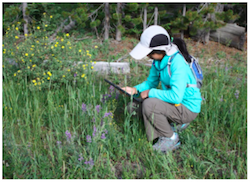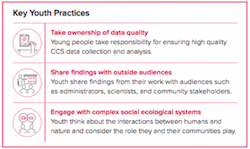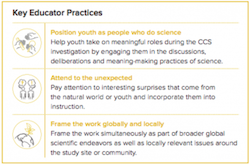Youth-focused Community and Citizen Science
This blog post, authored by Ryan Meyer, Heidi Ballard, and Lila Higgins, originally appeared on the Blue Sky Funders Forum blog.
When do experiences with science lead young people to create change in their lives, landscapes, and communities? Consider this reflection from Rachel Anne Arias, a 12-year-old living in La Crescenta in Southern California:
Since taking the Nature Navigator classes, I think citizen science is a lot of fun. I enjoy helping scientists and I also enjoy seeing how citizen scientists like me can gather a wide range of observations. I think I would like to be an ecologist or wildlife biologist when I grow up so I can continue to work with wildlife and work with other people like me who enjoy citizen science and wildlife. For now, I am thinking about starting a citizen science club at my middle school next year. I am still trying to figure out the details of how to do that.
Rachel Anne contributed this reflection in her second year participating in the Nature Navigator Program, based at the Natural History Museum of Los Angeles County. It’s just one of many youth-focused community and citizen science (YCCS) programs all over the world, in which youth contribute to authentic science. YCCS projects are extremely varied, and they may take place in both formal and informal learning environments. Youth may collect data, design quality control procedures, conduct analyses, present findings to a variety of audiences, help to organize and mentor their colleagues, or identify research questions, among other activities. What’s important is that their work matters outside of the educational context, whether to the research program of a professional scientist, or to the concerns of a local community.
Wherever it takes place — a school, a science museum, a girl scout gathering, or a family camping trip — YCCS has the potential to deepen learning, leading youth to create change in their lives, landscapes, and communities. We know this because our team at the Center for Community and Citizen Science, based at the UC Davis School of Education, has been investigating what happens when youth participate in authentic science. For the last four years we have been observing and interviewing youth in a range of YCCS projects: in classrooms, on field trips, in afterschool programs, in single-day family events, among others, to try to understand when and how these experiences contribute to meaningful learning.
What do we mean by learning?
We are interested in more than just science content knowledge (although that is important). Our research examines how youth acquire new skills, adopt new roles, and come to see themselves as developing expertise in science, in environmental issues, and in their communities. We also look at ways in which learning fosters agency — the ability to act on the world in personally meaningful ways.
Thinking back to Rachel Anne’s reflection above, we can see that her learning process has been about much more than species’ names, or other scientific concepts. She has also taken on new roles, seen new paths for herself, and identified opportunities to take action in her community, based on her developing expertise. Collectively, we refer to these elements as environmental science agency (ESA); specifically, the components of ESA are:
- Deepening understanding of environmental science content and practice;
- Identifying areas of expertise in environmental science; and
- Using experiences in YCCS as foundation for change.
Identifying What Works
It’s important to point out that in our research we did not see evidence of environmental science agency developing for every young person in every YCCS context. So we worked to identify pathways toward ESA that were important across different kinds of projects, and the practices that youth and educators can use to move along those pathways.
The red and yellow tables give brief descriptions of those key practices, and we provide a variety of examples and tips for implementation on the YCCS project website. There, you can also see scientists and practitioners describe and discuss YCCS in general, and these key practices in a pair of short videos.
Looking Ahead
We have been partnering closely with educators, scientists, and practitioners, drawing on their expertise to conduct research and develop practical insights. We’ve found that the key practices can apply to just about any YCCS project that educators might want to use with their youth participants. For next steps in our research, we are continuing to study new cases of YCCS projects and how youth might develop ESA through the LEARN CitSci, a research project examining citizen science projects led by Natural History Museums in San Francisco and Los Angeles, CA and London, UK.
We’ve also developed teacher workshops to instill and support the
key practices for teachers using community and citizen science in
their classes. So in the future we’d like to study teacher
experiences with these and new emerging key practices, especially
across a variety of contexts, and in relation to supporting Next
Generation Science Standards and environmental literacy. We’ve
gotten great feedback on our teacher professional development
workshops focused on YCCS, and we are now looking for ways scale
up that work, and expand its appeal by connecting to
Environmental Literacy standards as well as to NGSS. In the end
we hope that we can help teachers and out-of-school educators use
YCCS to facilitate deep learning about environmental science as a
way to steward our habitats and communities for a
lifetime.
Heidi Ballard is founder and faculty director of the Center for Community and Citizen Science. Heidi’s research and practice have formed the foundation for the Center. She is leading the development of its overarching vision and mission, and building partnerships and collaborations across the University and beyond. She is Associate Professor and Chancellor’s Fellow at the UC Davis School of Education.
Lila Higgins is citizen science manager at the Natural History Museum of Los Angeles County. She is a museum educator with 13 years of experience in museum education and citizen science programming. She holds a bachelor’s degree in entomology from UC, Riverside and a master’s degree in environmental education from California State University, San Bernardino.
Ryan Meyer is executive director of the Center for Community and Citizen Science where he leads strategic, financial, and operational development of the Center, and collaborates on many of its research initiatives. He has has studied science and society, and worked with governments and scientists to improve the links between science and decision making.












